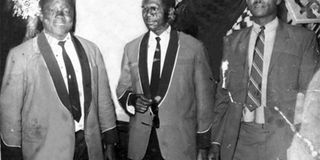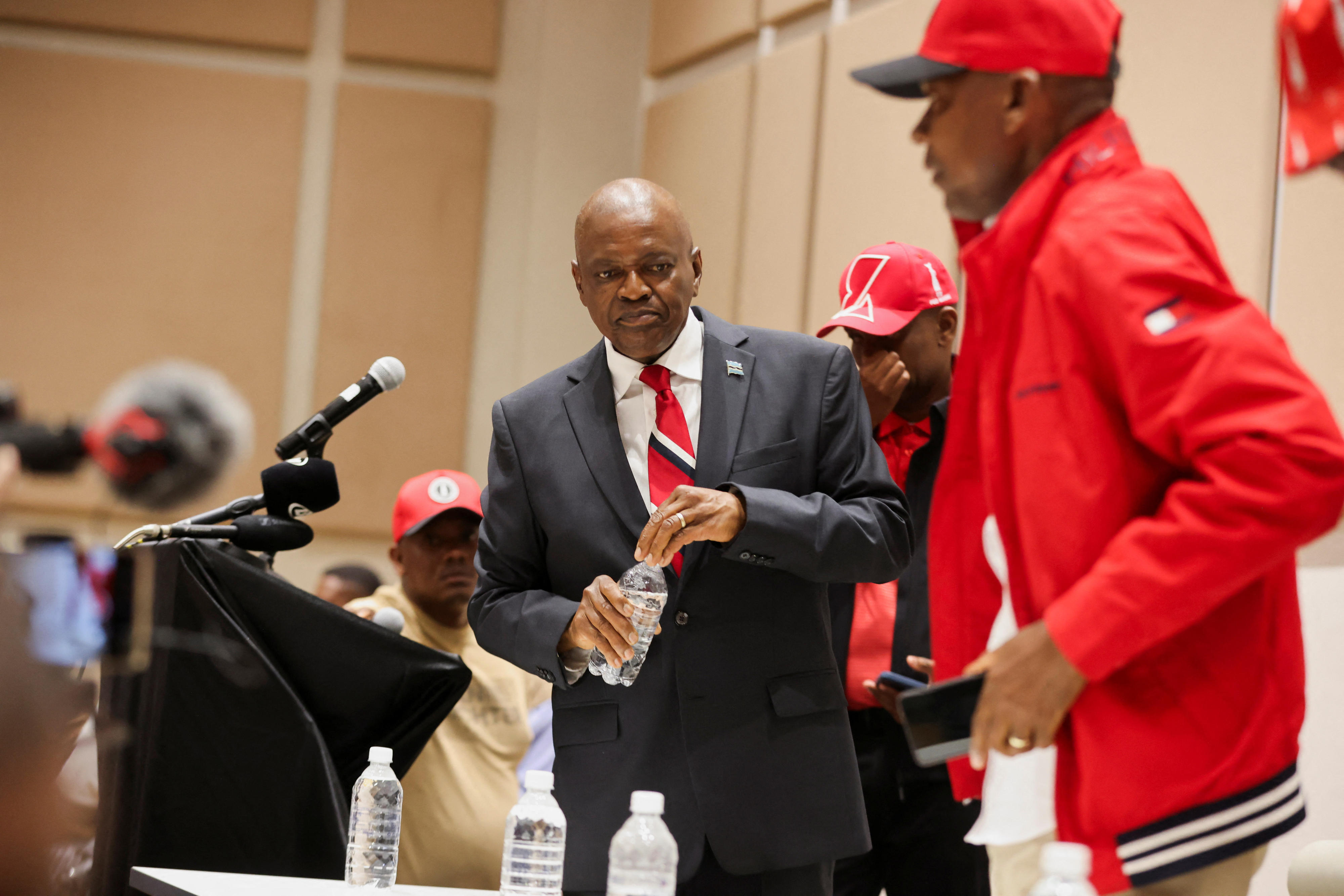Prime
WHERE IS OPIO GIRA?: Their father disappeared 34 years ago

Mr.Opio Gira (Centre) sharing a light moment with friends.Mr.Otto (Right) a member of the Police Jazz Band with unidentified friend to the left (during one of the golden days in the 1970s). COURTESY photo
What you need to know:
A family’s tale. It has been 34 years since Ibrahim Opio Gira disappeared at the hands of state operatives like many in his time, but his family is still hopeful that one day they will give him a decent burial. They told life their story.
One hot afternoon on July 31, 1978, Ibrahim Opio Gira was driving to town from his Luzira home in his Peugeot, registration number UYT 404 when out of blue a vehicle with strange looking people stopped him near Silver Spring Hotel. Being innocent as he thought Opio wondered what all the fuss was about. Had they mistaken him for someone else, may be a hard core criminal, robber or even coffee smuggler?
However to his surprise, one of the car occupants assured his colleagues that he was indeed the one. Later it emerged that these were nothing but the notorious State Research Bureau operatives. During Amin’s time, being a Langi was considered by many as very dangerous and synonymous with signing one’s own death certificate. This was not the first time Opio Gira was being arrested.
The previous year, on Thursday February 24, a week after the arrest and execution of Anglican Archbishop Jonan Luwum, Opio had been picked from his home by the State Research people for questioning on allegations that he had been collaborating with the slain Archbishop and plotting to overthrow the “beloved” government of Uganda. That time he was so lucky to be released after investigations found him innocent. “We were all happy and relieved seeing him being returned home in a Mercedes Benz with registration number UVN 395,” recalls one of Opio’s sons, Wilson Gira.
After that incident many friends and relatives of the late advised him to escape and go into exile for a simple reason that once Amin’s henchmen targeted someone, it was most likely that they would return and this time their captor would disappear for good. Opio Gira however turned a deaf ear and insisted he was innocent, even making it clear that there was no way he was going to abandon his family. “How can I leave you alone, I know I’m innocent; let them kill me if they want. If this happens you should leave Kampala and go back home to Lira,” he told his children.
Troubled days
On the day of his arrest, Wilson Gira knew something bad had happened. Then in Senior Two at Kitante Hill School, it was approaching 6.30pm, but his father was not coming to pick him yet he had always been punctual. “I smelt a rat, but fortunately, had some coins I had saved at break time, which I used to take a taxi back home.” At home it was so tense. Opio’s wife Hellen Amongi was so troubled and anticipated nothing but doom for the once happy family.
Being a simple housewife and jobless, she immediately sensed danger in the absence of the family’s bread winner. “This was the saddest moment in my life. My husband had since independence worked tirelessly for his country only in the end to be rewarded with death,” Amongi said with sadness during the interview at her daughter’s home in Ntinda police barracks. Thoughts of how to feed the family plus sustaining the children in school in particular almost made her go “mad”. The feeding problem was partly solved when a Good Samaritan from the Prisons department brought the family a bag of posho and some beans. The items though included no sugar, for it would be a miracle then to get even a half kilo of sugar in Kampala.
Three days after his arrest and detention, Opio Gira pleaded with his captors at State Research Bureau to at least allow him call home and direct his wife and children where he had kept some little money to be used to buy food. “Instead it was one of his captors that called on his behalf and instructed Wilson who picked the phone to look for some money somewhere below one radio gram. Wilson pleaded with the tough talking caller to allow us talk to him but the soldier answered that this would not be possible,” recalls the wife.
Meanwhile, the family contacted some friendly influential people in Amin’s government to help them secure Opio’s release. Some of these were Muhammed Hassan, an influential Nubian and owner of Holiday Tour and Travel along Kimathi Avenue, Muhammed Sebbi, the deputy minister of agriculture and animal husbandry, George Mugisha the Principal Accountant, ministry of Finance plus a brother to one of Amin’s wives, Sarah. It was Muhammed Hassan who acted and managed to confront his contacts at State Research Bureau.
Doom looms
He assured the family that Opio was still alive and in good condition. Hassan even claimed to have seen his file which he said contained four very serious accusations. First of all, Opio was accused of having gone to Kenya to shop for the prisons band instruments and stayed at Inter-continental hotel where some Ugandan exiles and those plotting to depose Idi Amin were putting up. Notes in the file talked of a possibility that Opio Gira being a Langi therefore must have talked to some of these Ugandan exiles.
Besides, he was accused of having attended a suspicious fundraising ceremony in Ayala, Kole district which some of Oyite Ojok’s agents too allegedly attended and collected money to be sent to former president Milton Obote. State Research also accused Opio of having allowed Obote’s former army chief David Oyite Ojok to marry his sister. Most serious of all, Opio was accused of having funded the training at Fort Patiko in Gulu of rebels intending to topple Idi Amin. All effort taken to seek the release of the Prisons band director hit a dead end as Amin’s State Research officers whenever contacted claimed to still be investigating.
On November 12, 1978 the sad news filtered through. The family was informed by insiders about the cruel execution of the prisons band big man, something that was also confirmed by Wilson’s uncle Timothy Ondiek, formerly a commandant at Naguru Police Headquarters. “We were told the accusation against him were found untrue and was about to be released but something bad happened at the front line where Amin’s soldiers were trying to contain the invading rebels from Tanzania,” Wilson said.
One evening, an army officer reportedly returned with rage and instructed his colleagues at State Research Bureau to avenge defeat at war by executing many detainees whom he termed as rebels collaborators. Sadly, this did not spare Opio. It was after the 1979 Liberation War that Muhammed Ogeny, the former commander of the Special Forces under Obote II that told the family the way Opio was killed. According to him, his limbs were first cut off and he later died of torture. His body plus those of others were transported to Luzira Prison grounds in the dead of the night and buried somewhere around upper prison.
Three days later (On November 15, 1978) an officer from the Prisons Department visited the late Opio’s home to record all property that belonged to the government. On November 20, the family was ordered to leave the government house and was given transport to go back to the village. It all seemed over. Back at Ngetta, the widow resorted to cultivating and selling local brew to keep the family going. Despite this, soon one of the daughters and three sons dropped out of school. Dorothy Akello, joined the Police Force while three of her brothers, George Okello, Martin Owani and Moses Atiang joined were forced to join the army in order to make ends meet.
Akello, 49 now a sergeant in the Police Force works with the Counter Terrorism Department that deals with the demolition of bombs and landmines in war ravaged areas. She is a graduate of the International Mine Action Centre in Embakassi, Kenya. The family’s last born, Christine Anyang was only four when their father disappeared and now works with a hotel in Jinja, having done a catering course.
Wilson Gira, on the other hand is a graduate of Loroo PTC in Ayam and Ndejje TTC. He teaches at VH Public School in Lira while the other surviving child, Alere Nelson is an hotelier in town. The rest have since passed on. Apart from Christine, all the children were born in Kenya where the late Opio Gira once served in the Kenyan Police Force.
The golden memories
What sort of person was Ibrahim Opio Gira? Dorothy describes her father as one who was very caring and who always worked heaven and earth for the well-being of the family. “He would always stop mum from caning us. He loved us so much especially we the daughters and would at times joke that he would never allow us get married for fear that men might mistreat us,” says his daughter Dorothy Akello.
Wilson Gira, will never forget the music talent his father possessed. According to him, many musicians of the time used to flock their home to be trained and their instruments repaired and these included among others Afrigo Band’s Moses Matovu. Wilson will never forget one interesting incident during the seventies when the family still lived at plot 29 on Martin road in Old Kampala .
“We were neighbours to the no nonsense army officer by the name of Juma Butabika. He once directed dad and his prisons band to perform as army equipment like tanks and jeeps that had just been acquired from Russia were being exhibited and transported along Kampala road and all the way to Malire barracks (current Lubiri palace). Even we children were ordered to be part of the parade and we enjoyed it so much,” he recalls with amusement.
However the golden memories the family have of Opio will not be complete until they find his grave. This has been the family’s wish for the past 34 years. Members of his family are appealing to former State Research Bureau operatives or anyone with information to help them locate Opio Gira’s grave so that they can give him a decent burial back home. Opio Gira’s last funeral rites were held in 1989 with his son Wilson Gira stepping into the big man’s shoes.
Opio’s children also call upon the government of Uganda through the ministry of Public Service to pay them their late father’s gratuity for his services as a former civil servant. They claim that this money has never been released.




